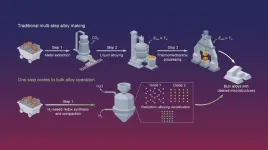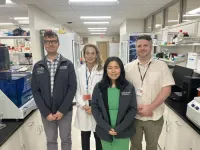(Press-News.org) In an article published in JAMA Network Open, researchers at the University of São Paulo’s Medical School (FM-USP) report on a study involving 774 men and women who followed a vegan diet in Brazil.
Their findings show that on average the participants consumed the recommended amount of proteins and essential amino acids, and that their diet consisted largely of unprocessed and minimally processed foods. However, participants who consumed proportionally lower levels of industrialized products such as protein supplements and textured soy protein were more likely to exhibit inadequate protein intake, suggesting a significant reliance on nutrients from ultra-processed proteins for this population.
Coined by researchers at the same university’s School of Public Health (FSP-USP), the term “ultra-processed products” refers to industrially formulated edible substances synthesized from fractionated ingredients and blended with chemical additives (colors, aromas, emulsifiers, thickeners etc.) to enhance their palatability.
“Our results contradict the stigma that a vegan diet can’t provide the amount of protein and essential amino acids a person needs, and show that a vegan diet can be nutritionally adequate. Moreover, the vegans included in the study consumed ultra-processed products less than the general population,” said Hamilton Roschel, last author of the article and head of the Applied Physiology and Nutrition Research Group at FM-USP's Center for Lifestyle Medicine.
FAPESP supported the study via five projects (19/14820-6, 19/14819-8, 20/07860-9, 22/02229-4 e 17/13552-2).
The researchers measured the participants’ intake of protein and essential amino acids, as well as calculating the proportions of unprocessed, processed and ultra-processed products in their meals, based on a diary kept by each participant to record everything they ate every day.
“Animal food products are known to be generally more dense in protein and essential amino acids. Meat, milk and eggs contain more protein per gram than rice or beans, for example. It was therefore important to investigate whether this requirement was met by diets consisting solely of plant protein,” Roschel said.
This was the main reason for investigating whether a vegan diet affords an adequate amount of protein and acceptable levels of essential amino acids.
The analysis performed by the researchers showed that the participants mostly consumed unprocessed and minimally processed foods, which accounted for 66.5% of energy intake, while ultra-processed products accounted for 13.2%. The proportions for the general population are 44.9% and 23.7% respectively, according to IBGE’s Household Budget Survey (POF).
The study also found a significant correlation between adequate protein intake and consumption of ultra-processed products. “Although this group consumed a small amount of ultra-processed products, some participants appeared to rely on them to meet their protein needs. This is partly because unprocessed foods are generally less dense in protein, a fact that paved the way for the so-called meat substitute industry, whose market share is growing,” Roschel said.
Meat substitutes consist of plant protein processed to mimic different types of meat, such as vegan hamburgers, sausages and nuggets. Cheese substitutes are also available, using soy, pea, rice or potato protein. Both are considered ultra-processed products.
It is worth noting that consumption of ultra-processed products is associated with a heightened risk of weight gain, diabetes, hypertension and other cardiovascular diseases, depression, some types of cancer, and premature death. Not all the effects of plant-based ultra-processed products are known, but recent evidence suggests they too may be unhealthy.
The researchers concluded that textured soy protein (TSP) and plant-based protein supplements were the main ultra-processed products determining adequate protein intake for Brazilian vegans.
“Although they tend to be classified as ultra-processed products, TSP and protein supplements aren’t necessarily unhealthy, which can’t be said of ultra-processed products that contain high levels of fat, sugar, sodium, preservatives and artificial additives, for example,” Roschel said.
Ultra-processed products as a broad category are considered unhealthy in many studies, but there is robust evidence that soy-derived foods do no harm to human health. “TSP is an important source of protein and essential amino acids for vegans, even though it’s classified as ultra-processed. Ultra-processed products vary considerably in terms of formulation, and despite the consensus that they should generally be avoided, it isn’t reasonable to ignore the clear differences between them,” he said.
As the researchers note, the same can be said about plant-based protein supplements, “an evidence-based strategy to support muscle health also associated with protein adequacy” in different contexts, such as when unprocessed and minimally processed foods do not supply sufficient protein or when a clinical condition requires a different kind of nutritional management. “In these contexts, plant-based protein plays an important role and should not be overlooked,” Roschel said.
“Our findings don’t show that ultra-processed products are good, and the findings should not be used to encourage their consumption. However, it would be wrong to close one’s eyes to the significant differences among them and the importance of the role they play in certain contexts.
“The results of the study suggest a need for policies to facilitate access to more natural and healthy foods, as well as efforts to improve nutritional education so that this population can make better dietary choices. As the market for plant-based foods expands, regulation by the government is urgently needed to enable affordable products to be developed with transparency regarding their composition, high quality, and clearly identified health benefits.”
About São Paulo Research Foundation (FAPESP)
The São Paulo Research Foundation (FAPESP) is a public institution with the mission of supporting scientific research in all fields of knowledge by awarding scholarships, fellowships and grants to investigators linked with higher education and research institutions in the State of São Paulo, Brazil. FAPESP is aware that the very best research can only be done by working with the best researchers internationally. Therefore, it has established partnerships with funding agencies, higher education, private companies, and research organizations in other countries known for the quality of their research and has been encouraging scientists funded by its grants to further develop their international collaboration. You can learn more about FAPESP at www.fapesp.br/en and visit FAPESP news agency at www.agencia.fapesp.br/en to keep updated with the latest scientific breakthroughs FAPESP helps achieve through its many programs, awards and research centers. You may also subscribe to FAPESP news agency at http://agencia.fapesp.br/subscribe.
END
Vegans’ intake of protein and essential amino acids is adequate but ultra-processed products are also needed
The study concluded that textured soy protein and plant-based protein supplements were the main ultra-processed products determining adequate protein intake for Brazilian vegans. The research involved 774 men and women.
2024-09-19
ELSE PRESS RELEASES FROM THIS DATE:
Major $21 million Australian philanthropic investment to bring future science into disease diagnosis
2024-09-19
An outstanding $21 million philanthropic investment will establish a pioneering research centre to advance precision diagnosis for diseases that affect millions of Australians.
The Colonial Foundation Diagnostics Centre will use cutting-edge ‘spatial biology’ technologies to deliver enhanced diagnosis and, in turn, personalised care for patients with inflammatory diseases, like rheumatoid arthritis and inflammatory bowel disease.
The centre, co-led by WEHI and the Royal Melbourne Hospital, and funded by the Colonial Foundation, builds on an existing partnership that has pioneered potential new tests for detecting early-stage dementia.
At a glance
A $21 million ...
Innovating alloy production: A single step from ores to sustainable metals
2024-09-19
Metal production is responsible for 10% of global CO2 emissions, with iron production emitting two tons of CO2 for every ton of metal produced, and nickel production emitting 14 tons of CO2 per ton and even more, depending on the ore used. These metals form the foundation of alloys that have a low thermal expansion, called Invar. They are critical for the aerospace, cryogenic transport, energy and precision instrument sectors. Recognizing the environmental toll, scientists at the Max Planck Institute for Sustainable Materials (MPI-SusMat) have now developed a new method to produce Invar alloys without emitting ...
New combination treatment brings hope to patients with advanced bladder cancer
2024-09-19
Findings from the international FORT-2 clinical trial showed that a combination treatment including immunotherapy is safe and tolerable in patients with locally advanced or metastatic bladder cancer. The results, which were recently published in JAMA Oncology, show potential to broaden the number of patients with bladder cancer who could benefit from immunotherapy, an approach that harnesses a patient's own immune system to fight cancer.
“The major problem with immunotherapy was it works great for some patients with ...
Grants for $3.5M from TARCC fund new Alzheimer’s disease research at UTHealth Houston
2024-09-19
Studies by researchers at UTHealth Houston seeking to understand the underlying pathology of Alzheimer’s disease in order to discover new pathways to treatment have earned multiple awards totaling $3.5 million from the Texas Alzheimer’s Research and Care Consortium (TARCC).
A state-funded organization composed of 11 medical schools across the state, the goal of the TARCC is to fund Alzheimer’s-related projects within the member institutions and promote collaborative efforts. Rodrigo Morales, PhD, professor of neurology with McGovern Medical ...
UTIA researchers win grant for automation technology for nursery industry
2024-09-19
University of Tennessee Extension and UT AgResearch scientists have been awarded part of a nearly $10 million grant from the U.S. Department of Agriculture to study ways to use automation and robotics to address the labor shortage in the nursery crops industry.
Growing plants in a nursery is highly dependent on manual labor, making this industry particularly prone to worker shortages. An increasingly scarce workforce is limiting production, economic development and prosperity in the rural communicates where nurseries ...
Can captive tigers be part of the effort to save wild populations?
2024-09-19
Captive tigers in the United States outnumber those living in the wild. The World Wildlife Federation estimates around 5,000 of the big cats reside in the U.S., mostly owned by private citizens.
The health of this population is a genetic mystery for conservation groups and researchers interested in how the captive tigers could help stabilize or restore wild tiger populations. Are the privately owned animals just like tigers in the wild, or do they reflect characteristics popular in the illegal trade? Are they a hodgepodge of wild tiger ancestry, ...
The Ocean Corporation collaborates with UTHealth Houston on Space Medicine Fellowship program
2024-09-19
UTHealth Houston and The Ocean Corporation are collaborating on UTHealth Houston’s Space Medicine Training Fellowship program, which now includes a two-week intensive training focused on hyperbaric technologies and analog environments akin to those astronauts experience during extravehicular activities (EVAs), or space walks.
The training will enhance the hands-on learning experience of fellows in the Space Medicine Fellowship program, giving them a deeper understanding of physiological and medical challenges encountered in extreme environments.
“Integrating ...
Mysteries of the bizarre ‘pseudogap’ in quantum physics finally untangled
2024-09-19
By cleverly applying a computational technique, scientists have made a breakthrough in understanding the ‘pseudogap,’ a long-standing puzzle in quantum physics with close ties to superconductivity. The discovery, presented in the September 20 issue of Science, will help scientists in their quest for room-temperature superconductivity, a holy grail of condensed matter physics that would enable lossless power transmission, faster MRI machines and superfast levitating trains.
Certain materials involving copper and oxygen display superconductivity (where electricity flows without resistance) at relatively high — but still frigid — temperatures below ...
Study: Proteins in tooth enamel offer window into human wellness
2024-09-19
A new way of looking at tooth enamel could give scientists a path to deeper understanding of the health of human populations, from the ancient to the modern.
The method, published this week in the Journal of Archaeological Science, examines two immune proteins found embedded in human tooth enamel: immunoglobulin G, an antibody that fights infection, and C-reactive protein, which is present during inflammation in the body.
“These proteins are present in tooth enamel, and they are something we can use to study the ...
New cancer cachexia treatment boosts weight gain and patient activity
2024-09-19
Researchers discovered a drug that safely and effectively helped cancer patients when they suffered from cachexia (ku-KEK-see-uh), a common condition related to cancer that involves weight loss and muscle wasting.
The results of the randomized phase 2 clinical trial, which included187 individuals who experienced cachexia with lung, pancreatic, or colorectal cancer, were reported in the New England Journal of Medicine on Sept. 14, 2024. Richard Dunne, MD, MS, a Wilmot Cancer Institute oncologist and cachexia expert was part of the large group of investigators ...
LAST 30 PRESS RELEASES:
Brainwaves of mothers and children synchronize when playing together – even in an acquired language
A holiday to better recovery
Cal Poly’s fifth Climate Solutions Now conference to take place Feb. 23-27
Mask-wearing during COVID-19 linked to reduced air pollution–triggered heart attack risk in Japan
Achieving cross-coupling reactions of fatty amide reduction radicals via iridium-photorelay catalysis and other strategies
Shorter may be sweeter: Study finds 15-second health ads can curb junk food cravings
Family relationships identified in Stone Age graves on Gotland
Effectiveness of exercise to ease osteoarthritis symptoms likely minimal and transient
Cost of copper must rise double to meet basic copper needs
A gel for wounds that won’t heal
Iron, carbon, and the art of toxic cleanup
Organic soil amendments work together to help sandy soils hold water longer, study finds
Hidden carbon in mangrove soils may play a larger role in climate regulation than previously thought
Weight-loss wonder pills prompt scrutiny of key ingredient
Nonprofit leader Diane Dodge to receive 2026 Penn Nursing Renfield Foundation Award for Global Women’s Health
Maternal smoking during pregnancy may be linked to higher blood pressure in children, NIH study finds
New Lund model aims to shorten the path to life-saving cell and gene therapies
Researchers create ultra-stretchable, liquid-repellent materials via laser ablation
Combining AI with OCT shows potential for detecting lipid-rich plaques in coronary arteries
SeaCast revolutionizes Mediterranean Sea forecasting with AI-powered speed and accuracy
JMIR Publications’ JMIR Bioinformatics and Biotechnology invites submissions on Bridging Data, AI, and Innovation to Transform Health
Honey bees navigate more precisely than previously thought
Air pollution may directly contribute to Alzheimer’s disease
Study finds early imaging after pediatric UTIs may do more harm than good
UC San Diego Health joins national research for maternal-fetal care
New biomarker predicts chemotherapy response in triple-negative breast cancer
Treatment algorithms featured in Brain Trauma Foundation’s update of guidelines for care of patients with penetrating traumatic brain injury
Over 40% of musicians experience tinnitus; hearing loss and hyperacusis also significantly elevated
Artificial intelligence predicts colorectal cancer risk in ulcerative colitis patients
Mayo Clinic installs first magnetic nanoparticle hyperthermia system for cancer research in the US
[Press-News.org] Vegans’ intake of protein and essential amino acids is adequate but ultra-processed products are also neededThe study concluded that textured soy protein and plant-based protein supplements were the main ultra-processed products determining adequate protein intake for Brazilian vegans. The research involved 774 men and women.






